Ethical Standards in ICT: A Case Study on Authorship and Recognition
VerifiedAdded on 2023/06/15
|6
|1248
|284
Case Study
AI Summary
This case study examines ethical breaches within the ICT sector, specifically focusing on a scenario where Michael takes credit for Courtney's work on a project designed to support remote aboriginal communities. The analysis highlights violations of the Australian Computer Society (ACS) Code of Conduct, particularly concerning honesty, professional development, and professionalism. Michael's actions undermine Courtney's contributions, hinder her professional growth, and demean the ICT profession's image. The paper emphasizes the importance of adhering to ethical standards to maintain public trust, foster professional development, and ensure that ICT professionals meet their obligations to society. The ACS Code of Conduct serves as a crucial framework for guiding ethical behavior and promoting accountability within the industry. Desklib provides a platform for students to access similar case studies and solved assignments.

Running Head: Ethics 1
Ethics
Ethics
Paraphrase This Document
Need a fresh take? Get an instant paraphrase of this document with our AI Paraphraser
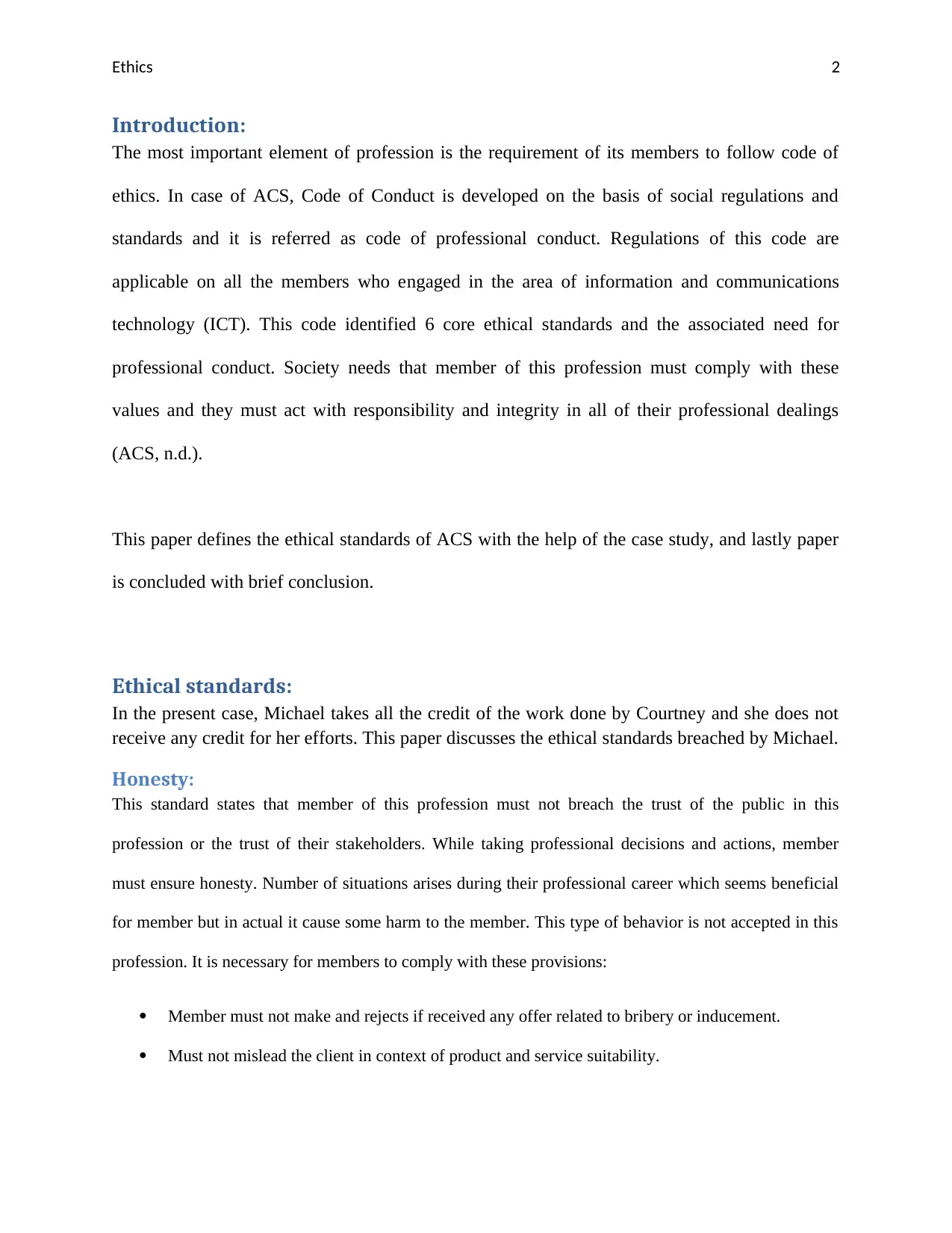
Ethics 2
Introduction:
The most important element of profession is the requirement of its members to follow code of
ethics. In case of ACS, Code of Conduct is developed on the basis of social regulations and
standards and it is referred as code of professional conduct. Regulations of this code are
applicable on all the members who engaged in the area of information and communications
technology (ICT). This code identified 6 core ethical standards and the associated need for
professional conduct. Society needs that member of this profession must comply with these
values and they must act with responsibility and integrity in all of their professional dealings
(ACS, n.d.).
This paper defines the ethical standards of ACS with the help of the case study, and lastly paper
is concluded with brief conclusion.
Ethical standards:
In the present case, Michael takes all the credit of the work done by Courtney and she does not
receive any credit for her efforts. This paper discusses the ethical standards breached by Michael.
Honesty:
This standard states that member of this profession must not breach the trust of the public in this
profession or the trust of their stakeholders. While taking professional decisions and actions, member
must ensure honesty. Number of situations arises during their professional career which seems beneficial
for member but in actual it cause some harm to the member. This type of behavior is not accepted in this
profession. It is necessary for members to comply with these provisions:
Member must not make and rejects if received any offer related to bribery or inducement.
Must not mislead the client in context of product and service suitability.
Introduction:
The most important element of profession is the requirement of its members to follow code of
ethics. In case of ACS, Code of Conduct is developed on the basis of social regulations and
standards and it is referred as code of professional conduct. Regulations of this code are
applicable on all the members who engaged in the area of information and communications
technology (ICT). This code identified 6 core ethical standards and the associated need for
professional conduct. Society needs that member of this profession must comply with these
values and they must act with responsibility and integrity in all of their professional dealings
(ACS, n.d.).
This paper defines the ethical standards of ACS with the help of the case study, and lastly paper
is concluded with brief conclusion.
Ethical standards:
In the present case, Michael takes all the credit of the work done by Courtney and she does not
receive any credit for her efforts. This paper discusses the ethical standards breached by Michael.
Honesty:
This standard states that member of this profession must not breach the trust of the public in this
profession or the trust of their stakeholders. While taking professional decisions and actions, member
must ensure honesty. Number of situations arises during their professional career which seems beneficial
for member but in actual it cause some harm to the member. This type of behavior is not accepted in this
profession. It is necessary for members to comply with these provisions:
Member must not make and rejects if received any offer related to bribery or inducement.
Must not mislead the client in context of product and service suitability.
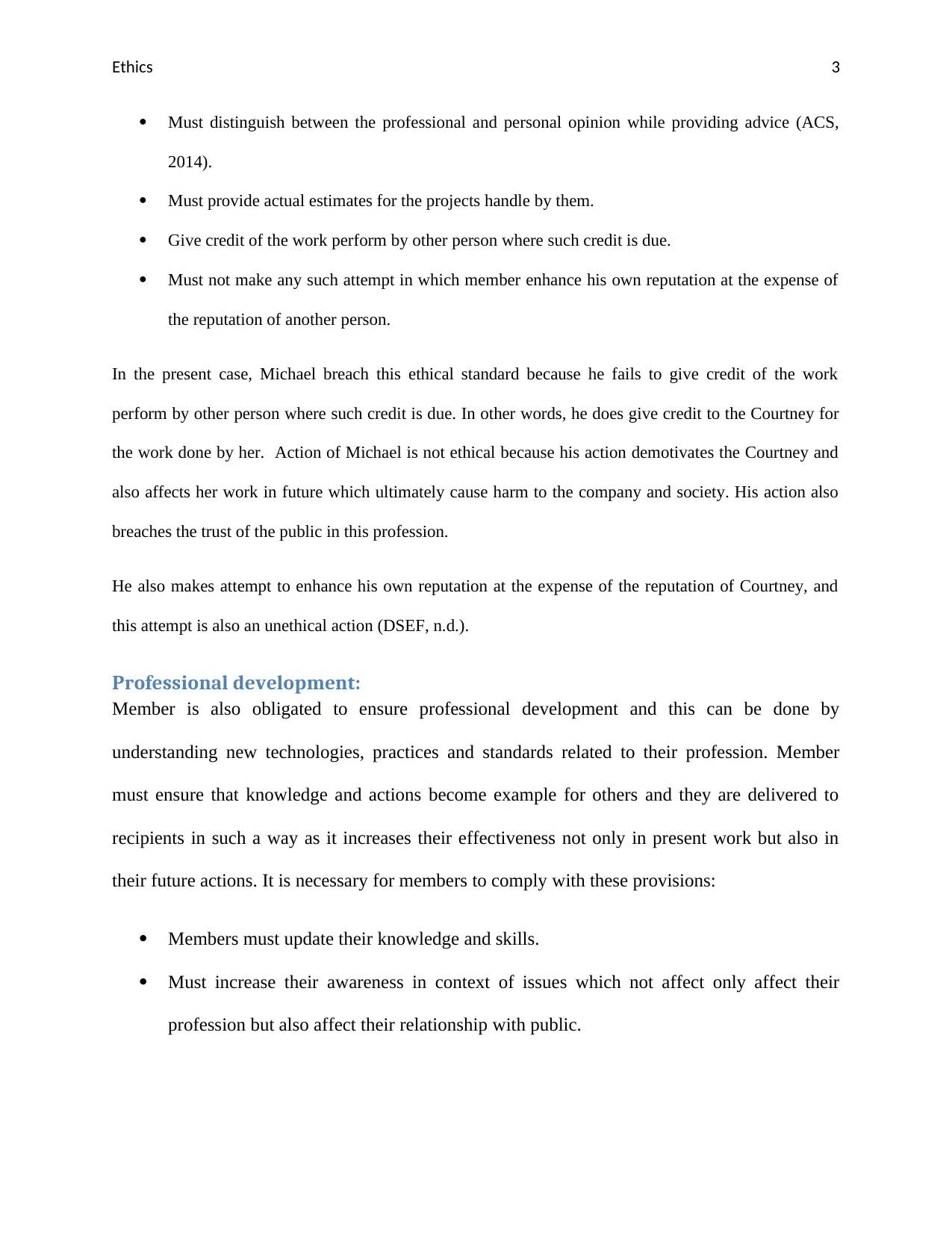
Ethics 3
Must distinguish between the professional and personal opinion while providing advice (ACS,
2014).
Must provide actual estimates for the projects handle by them.
Give credit of the work perform by other person where such credit is due.
Must not make any such attempt in which member enhance his own reputation at the expense of
the reputation of another person.
In the present case, Michael breach this ethical standard because he fails to give credit of the work
perform by other person where such credit is due. In other words, he does give credit to the Courtney for
the work done by her. Action of Michael is not ethical because his action demotivates the Courtney and
also affects her work in future which ultimately cause harm to the company and society. His action also
breaches the trust of the public in this profession.
He also makes attempt to enhance his own reputation at the expense of the reputation of Courtney, and
this attempt is also an unethical action (DSEF, n.d.).
Professional development:
Member is also obligated to ensure professional development and this can be done by
understanding new technologies, practices and standards related to their profession. Member
must ensure that knowledge and actions become example for others and they are delivered to
recipients in such a way as it increases their effectiveness not only in present work but also in
their future actions. It is necessary for members to comply with these provisions:
Members must update their knowledge and skills.
Must increase their awareness in context of issues which not affect only affect their
profession but also affect their relationship with public.
Must distinguish between the professional and personal opinion while providing advice (ACS,
2014).
Must provide actual estimates for the projects handle by them.
Give credit of the work perform by other person where such credit is due.
Must not make any such attempt in which member enhance his own reputation at the expense of
the reputation of another person.
In the present case, Michael breach this ethical standard because he fails to give credit of the work
perform by other person where such credit is due. In other words, he does give credit to the Courtney for
the work done by her. Action of Michael is not ethical because his action demotivates the Courtney and
also affects her work in future which ultimately cause harm to the company and society. His action also
breaches the trust of the public in this profession.
He also makes attempt to enhance his own reputation at the expense of the reputation of Courtney, and
this attempt is also an unethical action (DSEF, n.d.).
Professional development:
Member is also obligated to ensure professional development and this can be done by
understanding new technologies, practices and standards related to their profession. Member
must ensure that knowledge and actions become example for others and they are delivered to
recipients in such a way as it increases their effectiveness not only in present work but also in
their future actions. It is necessary for members to comply with these provisions:
Members must update their knowledge and skills.
Must increase their awareness in context of issues which not affect only affect their
profession but also affect their relationship with public.
⊘ This is a preview!⊘
Do you want full access?
Subscribe today to unlock all pages.

Trusted by 1+ million students worldwide
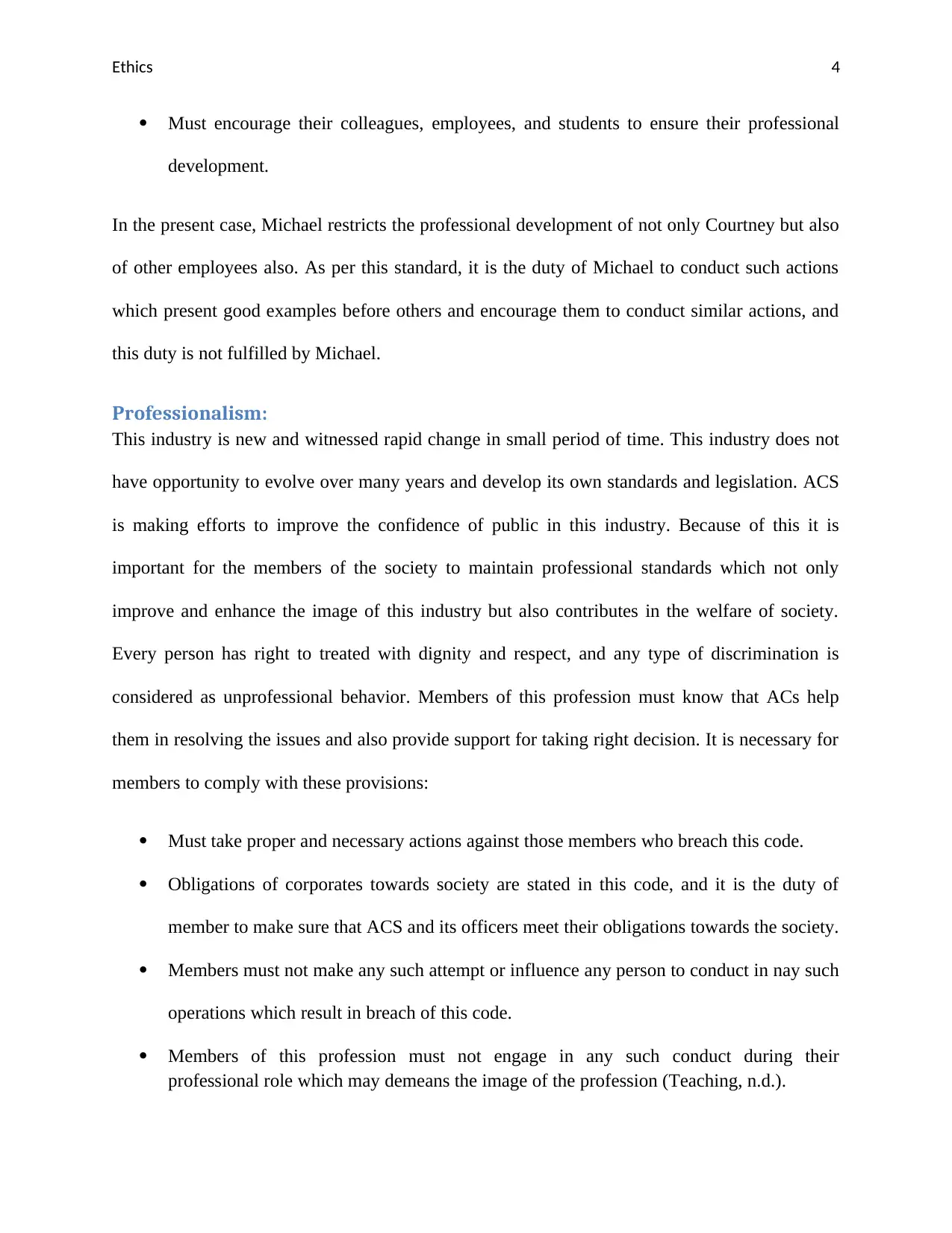
Ethics 4
Must encourage their colleagues, employees, and students to ensure their professional
development.
In the present case, Michael restricts the professional development of not only Courtney but also
of other employees also. As per this standard, it is the duty of Michael to conduct such actions
which present good examples before others and encourage them to conduct similar actions, and
this duty is not fulfilled by Michael.
Professionalism:
This industry is new and witnessed rapid change in small period of time. This industry does not
have opportunity to evolve over many years and develop its own standards and legislation. ACS
is making efforts to improve the confidence of public in this industry. Because of this it is
important for the members of the society to maintain professional standards which not only
improve and enhance the image of this industry but also contributes in the welfare of society.
Every person has right to treated with dignity and respect, and any type of discrimination is
considered as unprofessional behavior. Members of this profession must know that ACs help
them in resolving the issues and also provide support for taking right decision. It is necessary for
members to comply with these provisions:
Must take proper and necessary actions against those members who breach this code.
Obligations of corporates towards society are stated in this code, and it is the duty of
member to make sure that ACS and its officers meet their obligations towards the society.
Members must not make any such attempt or influence any person to conduct in nay such
operations which result in breach of this code.
Members of this profession must not engage in any such conduct during their
professional role which may demeans the image of the profession (Teaching, n.d.).
Must encourage their colleagues, employees, and students to ensure their professional
development.
In the present case, Michael restricts the professional development of not only Courtney but also
of other employees also. As per this standard, it is the duty of Michael to conduct such actions
which present good examples before others and encourage them to conduct similar actions, and
this duty is not fulfilled by Michael.
Professionalism:
This industry is new and witnessed rapid change in small period of time. This industry does not
have opportunity to evolve over many years and develop its own standards and legislation. ACS
is making efforts to improve the confidence of public in this industry. Because of this it is
important for the members of the society to maintain professional standards which not only
improve and enhance the image of this industry but also contributes in the welfare of society.
Every person has right to treated with dignity and respect, and any type of discrimination is
considered as unprofessional behavior. Members of this profession must know that ACs help
them in resolving the issues and also provide support for taking right decision. It is necessary for
members to comply with these provisions:
Must take proper and necessary actions against those members who breach this code.
Obligations of corporates towards society are stated in this code, and it is the duty of
member to make sure that ACS and its officers meet their obligations towards the society.
Members must not make any such attempt or influence any person to conduct in nay such
operations which result in breach of this code.
Members of this profession must not engage in any such conduct during their
professional role which may demeans the image of the profession (Teaching, n.d.).
Paraphrase This Document
Need a fresh take? Get an instant paraphrase of this document with our AI Paraphraser
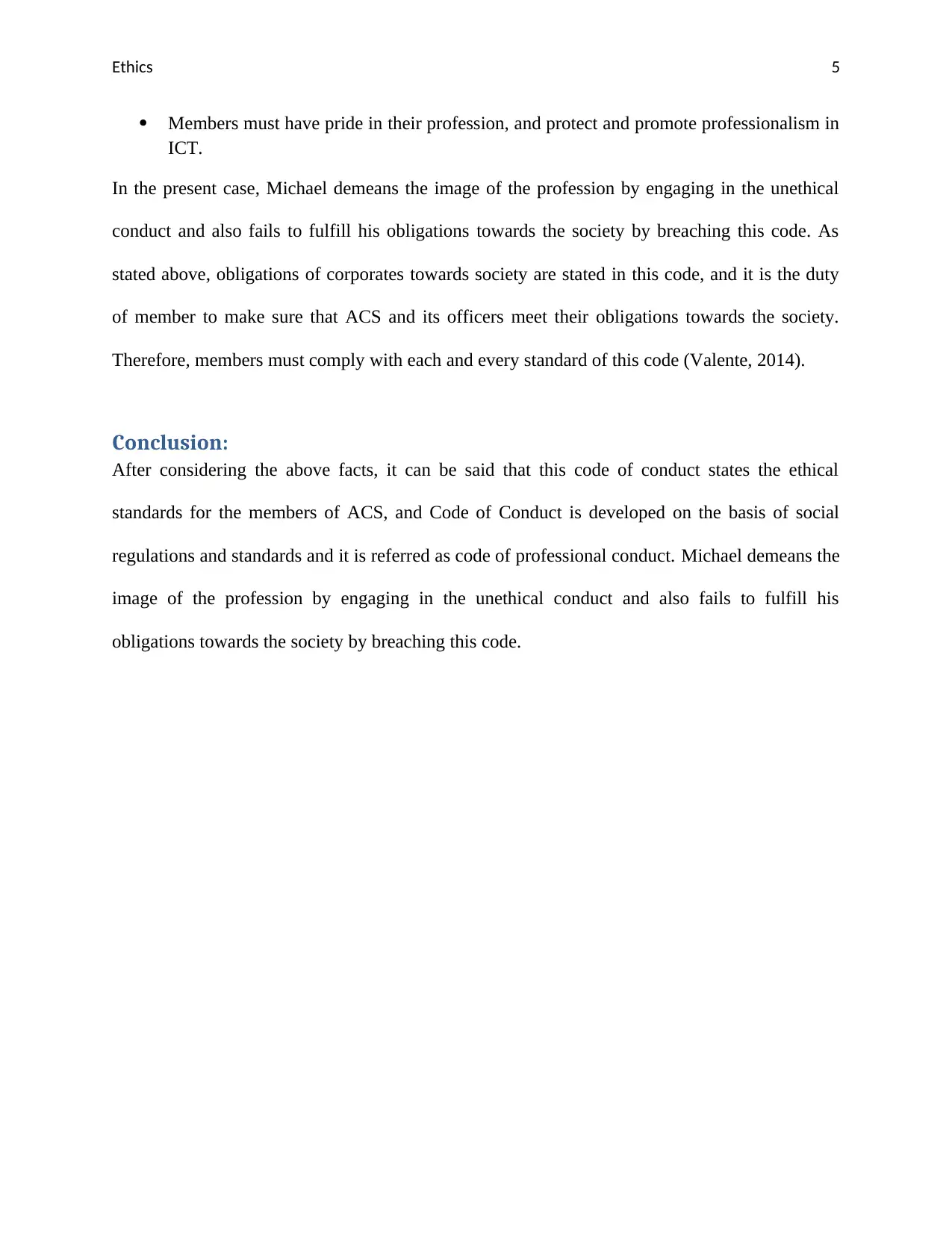
Ethics 5
Members must have pride in their profession, and protect and promote professionalism in
ICT.
In the present case, Michael demeans the image of the profession by engaging in the unethical
conduct and also fails to fulfill his obligations towards the society by breaching this code. As
stated above, obligations of corporates towards society are stated in this code, and it is the duty
of member to make sure that ACS and its officers meet their obligations towards the society.
Therefore, members must comply with each and every standard of this code (Valente, 2014).
Conclusion:
After considering the above facts, it can be said that this code of conduct states the ethical
standards for the members of ACS, and Code of Conduct is developed on the basis of social
regulations and standards and it is referred as code of professional conduct. Michael demeans the
image of the profession by engaging in the unethical conduct and also fails to fulfill his
obligations towards the society by breaching this code.
Members must have pride in their profession, and protect and promote professionalism in
ICT.
In the present case, Michael demeans the image of the profession by engaging in the unethical
conduct and also fails to fulfill his obligations towards the society by breaching this code. As
stated above, obligations of corporates towards society are stated in this code, and it is the duty
of member to make sure that ACS and its officers meet their obligations towards the society.
Therefore, members must comply with each and every standard of this code (Valente, 2014).
Conclusion:
After considering the above facts, it can be said that this code of conduct states the ethical
standards for the members of ACS, and Code of Conduct is developed on the basis of social
regulations and standards and it is referred as code of professional conduct. Michael demeans the
image of the profession by engaging in the unethical conduct and also fails to fulfill his
obligations towards the society by breaching this code.
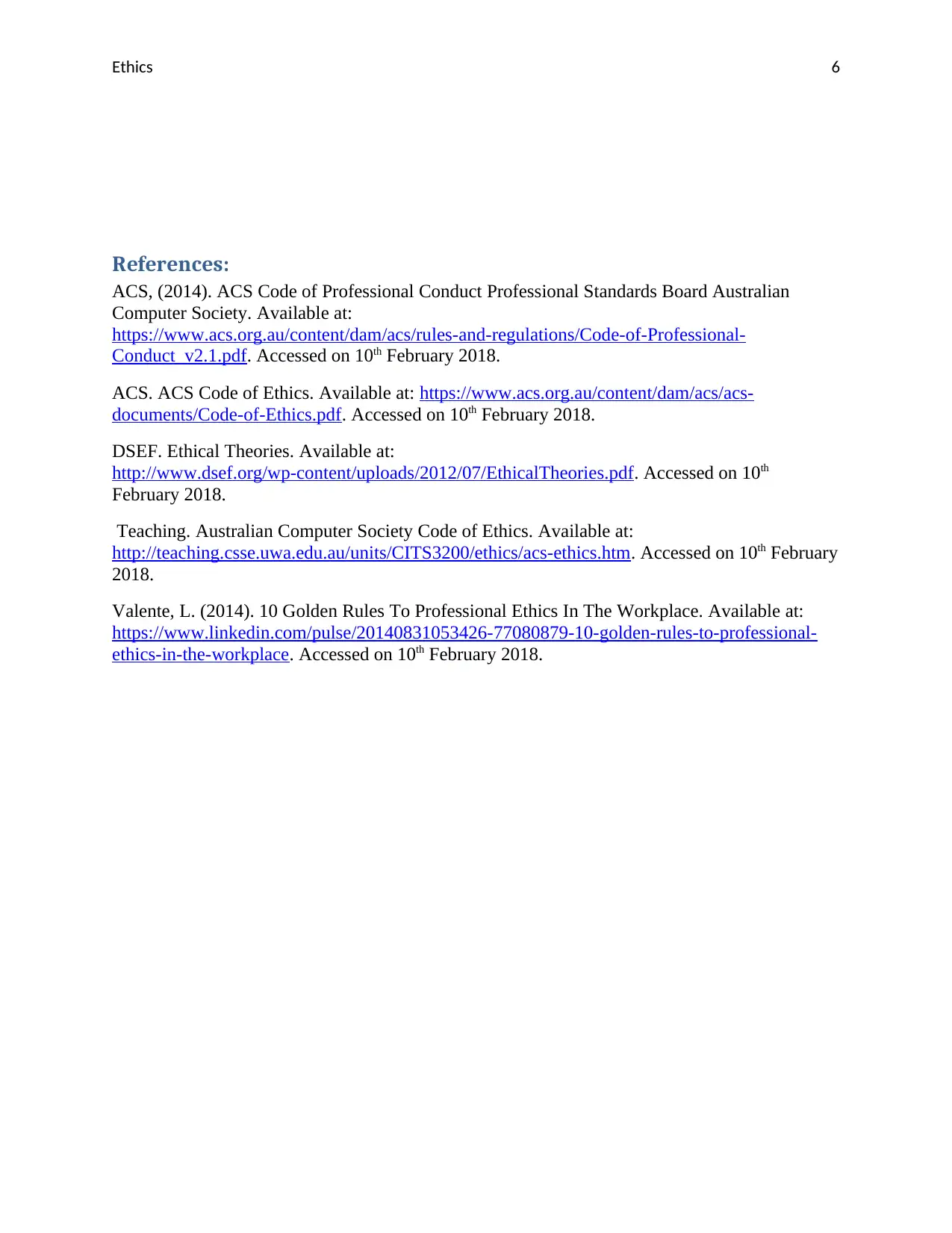
Ethics 6
References:
ACS, (2014). ACS Code of Professional Conduct Professional Standards Board Australian
Computer Society. Available at:
https://www.acs.org.au/content/dam/acs/rules-and-regulations/Code-of-Professional-
Conduct_v2.1.pdf. Accessed on 10th February 2018.
ACS. ACS Code of Ethics. Available at: https://www.acs.org.au/content/dam/acs/acs-
documents/Code-of-Ethics.pdf. Accessed on 10th February 2018.
DSEF. Ethical Theories. Available at:
http://www.dsef.org/wp-content/uploads/2012/07/EthicalTheories.pdf. Accessed on 10th
February 2018.
Teaching. Australian Computer Society Code of Ethics. Available at:
http://teaching.csse.uwa.edu.au/units/CITS3200/ethics/acs-ethics.htm. Accessed on 10th February
2018.
Valente, L. (2014). 10 Golden Rules To Professional Ethics In The Workplace. Available at:
https://www.linkedin.com/pulse/20140831053426-77080879-10-golden-rules-to-professional-
ethics-in-the-workplace. Accessed on 10th February 2018.
References:
ACS, (2014). ACS Code of Professional Conduct Professional Standards Board Australian
Computer Society. Available at:
https://www.acs.org.au/content/dam/acs/rules-and-regulations/Code-of-Professional-
Conduct_v2.1.pdf. Accessed on 10th February 2018.
ACS. ACS Code of Ethics. Available at: https://www.acs.org.au/content/dam/acs/acs-
documents/Code-of-Ethics.pdf. Accessed on 10th February 2018.
DSEF. Ethical Theories. Available at:
http://www.dsef.org/wp-content/uploads/2012/07/EthicalTheories.pdf. Accessed on 10th
February 2018.
Teaching. Australian Computer Society Code of Ethics. Available at:
http://teaching.csse.uwa.edu.au/units/CITS3200/ethics/acs-ethics.htm. Accessed on 10th February
2018.
Valente, L. (2014). 10 Golden Rules To Professional Ethics In The Workplace. Available at:
https://www.linkedin.com/pulse/20140831053426-77080879-10-golden-rules-to-professional-
ethics-in-the-workplace. Accessed on 10th February 2018.
⊘ This is a preview!⊘
Do you want full access?
Subscribe today to unlock all pages.

Trusted by 1+ million students worldwide
1 out of 6
Related Documents
Your All-in-One AI-Powered Toolkit for Academic Success.
+13062052269
info@desklib.com
Available 24*7 on WhatsApp / Email
![[object Object]](/_next/static/media/star-bottom.7253800d.svg)
Unlock your academic potential
Copyright © 2020–2026 A2Z Services. All Rights Reserved. Developed and managed by ZUCOL.




